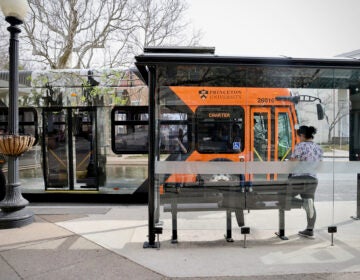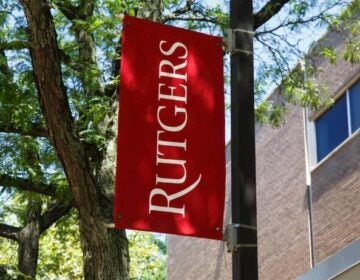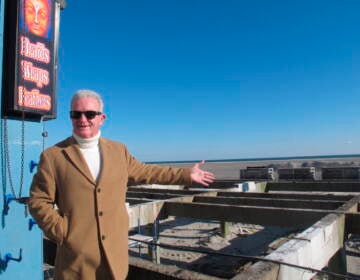Could anti-smoking hit jackpot outside Atlantic City casinos?
New Jersey prohibits indoor smoking in nearly all workplaces and in buildings open to the public like restaurants, stores and bars — with one huge exception, the casinos in Atlantic City.
Now, in what might be considered an ironic twist, Atlantic City is considering joining the smoke-free outdoor air movement.
On Wednesday, the Atlantic City Council considered an ordinance to ban smoking at playgrounds and ball fields, and if it passes, Atlantic City will present something of a paradox: Smoking will be illegal in certain outdoor space, but will still be permitted indoors at the casinos.
But to Dr. Fred Jacobs, former state health commissioner and chairman of the Tobacco Strike Force of the eastern region of the American Cancer Society, the battle against smoking is a long-term campaign with progress measured in incremental steps and partial victories.
It took a decade of lobbying to pass New Jersey’s 2006 Smoke Free Air Act, Jacobs said, something that would not have happened but for the Atlantic City casino compromise.
Atlantic City Councilman Marty Small Sr. is sponsoring the ordinance to ban smoking in all outdoor arenas, stadiums and amphitheaters, whether publicly or privately owned, and at all public playgrounds, athletic fields and courts. For economic reasons, he supports smoking at casinos. But with the resort’s first smoke-free casino opening earlier this month, some observers are hopeful the $2.4 billion Revel will help lay the groundwork for extending the smoking ban to other casinos.
“Revel is our first smoke-free casino, and maybe down the line, if Revel is as successful without smoking, other casinos will follow,” Small said.
Jacobs, who chairs New Jersey Breathes, a coalition of anti-smoking advocates, is also looking for incremental progress on restoring state funding for anti-smoking programs. Budget constraints have played a role in the steady dwindling of public funding for tobacco control programs. State and federal funds for tobacco programs, in 2012 and 2013, are budgeted at about $1.6 million a year. Jacobs hopes to persuade the legislature to increase funding to $30 million — a level not seen since 2003.
State Sen. Joseph F. Vitale (D-Middlesex), chairman of the Senate’s health committee, said he will look to move tobacco control funding legislation when lawmakers return after the recess that will follow passage of the new state budget, which must be approved and signed by June 30. Vitale said he will push for legislation that raises additional revenue by increasing taxes on non-cigarette forms of tobacco, including small cigars and chewing tobacco.
“It is a pretty dramatic increase [in funding] being proposed so we will have to see what is possible,” Vitale said.
The problem, he said, is that it’s not possible to adopt a law that restricts the use of these new taxes to tobacco control programs. “We can’t be sure it will be used for [anti-smoking] programs but the legislative intent will be in there,” Vitale said. “I hope the governor will be supportive. This is the No. 1 killer. Children who start smoking before age 21 die at a much earlier age and suffer from variety of illnesses.”
From a public health perspective, state Health Commissioner Mary E. O’Dowd said “anything that reduces smoking is the right thing to do, and I think that New Jersey in particular is doing a lot of very good things.” She noted that the state has a smoke-free indoor air act and cigarette tax – at $2.70 a pack, the sixth highest in the nation. The Centers for Disease Control cites both of those measures as “the two biggest ways to reduce the use of tobacco.”
O’Dowd said smoking should not be a standalone health program. “We know that tobacco is correlated with chronic diseases so our chronic disease program should focus on smoking cessation also. Our family health service, which focuses on prenatal care, should also focus on smoking. One of the ways that we should be leveraging our resources more effectively is focusing on how do you embed an anti-smoking message into everything that we do within public health.”
Although O’Dowd said she didn’t have a position on whether or not to raise tobacco taxes as Vitale proposes, “from a public health perspective, anything that helps reduce the initiation of smoking or helps people quit smoking is a good thing.”
According to the state health department, New Jersey has the sixth lowest adult smoking rate in the nation at 14.4 percent in 2010, compared to a national average of 19.3 percent. According to the health department, in 1996 the adult smoking rate in New Jersey was 22.7 percent. Among New Jersey students 12 to 17, 14.3 percent were smokers in 2010, down from 27.6 percent in 1999.
Blair Horner, vice president of advocacy for the Eastern Division of the American Cancer Society, cited the latest reports from the U.S. Surgeon General that an aggressive program to combat childhood and teen smoking could cut the rate of youth smoking in half by 2020. Such programs require funding to combat the advertising and marketing from tobacco companies targeted to teens, Horner said.
“There is a body of evidence that connects the intentional marketing of tobacco products to young people as a primary cause of why young people smoke.” Horner said the surgeon general advocates a coordinated, anti-smoking program. “To have a significant effect, you have to spend money. It is going to take governmental commitment to make this happen.”
NJ Spotlight is an online news service providing insight and information on issues critical to New Jersey, with the aim of informing and engaging the state’s communities and businesses.
WHYY is your source for fact-based, in-depth journalism and information. As a nonprofit organization, we rely on financial support from readers like you. Please give today.




